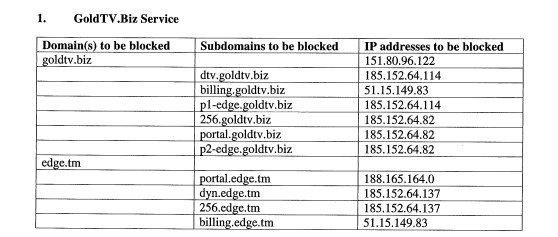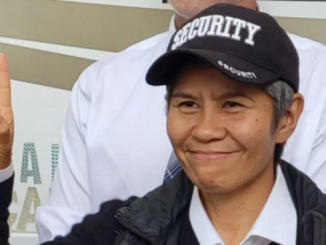
A group of major broadcasters and telco giants, including Rogers and Bell, have obtained the first Canadian pirate site blocking order. The Federal Court approved a request that requires several major ISPs to block access to domains and IP-addresses of the pirate IPTV service GoldTV. The order paves the way for a broader site blocking push, that may target traditional pirate sites as well.
Last year, a coalition of copyright holders and major players in the telco industry asked the Canadian Government to institute a national pirate site blocking scheme.
The Fairplay coalition argued that such measures would be required to effectively curb online piracy. Canada’s telco regulator CRTC reviewed the request but eventually denied the application, noting that it lacks jurisdiction.
The driving forces behind the request, Bell, Rogers, and Groupe TVA, were not prepared to let the blocking idea slip away, however. A few months ago the companies filed a lawsuit against the operators of a ‘pirate’ IPTV service GoldTV.ca. The companies argued that the service provides access to their TV content without licenses or authorization.
Among other things, the rightsholders requested an interim injunction to stop the operators, who remain unidentified, from continuing to offer the allegedly-infringing IPTV service. This was granted, but despite the order, some of the infrastructures remained available.
This resulted in a follow-up request from the media giants, which became the setup for the first-ever pirate site blocking order in Canada. Specifically, the companies requested an interlocutory injunction order that would require several Canadian ISPs to block GoldTV domain names and IP-addresses.
Late last week this request was granted by a Federal Court in Ontario. An order, issued by Judge Patrick Gleeson, requires most of Canada’s largest ISPs, including Cogeco, Rogers, Bell, Eastlink and, TekSavvy, to start blocking their customers’ access to GoldTV within 15 days.

The order is unique in North America and relies heavily on UK jurisprudence, can be extended with new IP-addresses and domain names, if those provide access to the same IPTV service. The court doesn’t prescribe a specific blocking method but mentions DNS and IP-address blocking as options.
Since Rogers and Bell are also ISPs, these companies didn’t object to their own demands. Several other Internet providers didn’t protest either. However, TekSavvy did, listing a broad range of objections.
TekSavvy, for example, argued that blocking websites isn’t very effective, as subscribers have plenty of workarounds they can try, including VPNs. In addition, the company pointed out that many smaller ISPs are not affected by the order, which means that they don’t have to block the service.
Judge Gleeson recognized that blocking measures are not foolproof. However, based on the evidence provided, he concluded that it’s effective enough to make a difference.
“It’s clear from the evidence that site-blocking will not eliminate user access to infringing services. However, the evidence does establish that in those jurisdictions where site-blocking measures have been implemented there has been a significant reduction in visits to infringing websites.
“I am satisfied that a site-blocking order is an effective means of limiting access to GoldTV Services,” Judge Gleeson added.
TekSavvy further argued that it could become very costly to implement a site-blocking system, which would put a significant financial strain on the company. In addition, the order would set a precedent that could lead to hundreds or even thousands of site-blocking orders
Judge Gleeson didn’t agree with this assessment. TekSaffy can rely on DNS and IP-address blocking, which it’s already technically capable of. That wouldn’t require any new hardware investments. In addition, ISPs don’t have to pay the costs of the implementation, as that will be covered by the rightsholders.

TekSavvy also pointed out that site-blocking measures violate net neutrality and freedom of expression. But again, the Court was not convinced that this weighs stronger than the interests of the rightsholders.
“I am satisfied, in the face of a strong prima facie case of ongoing infringement and a draft order that seeks to limit blocking to unlawful sites and incorporates processes to address inadvertent over-blocking, that neither net neutrality nor freedom of expression concerns tip the balance against granting the relief sought,” Judge Gleeson writes.
All in all, the Federal Court sided with the copyright holders. This means that the first-ever pirate site blockade in Canada will soon be in effect. Whether TekSavvy or any of the other ISPs plan to appeal the decision is not known at this point.
The site-blocking question has been a point of debate in Canada over the past several months. While local authorities and lawmakers have spoken out against a non-judicial site-blocking regime, Judge Gleeson’s ruling shows that site-blocking injunctions certainly are an option.
Interestingly, this approach was previously raised by opponents of Fairplay Coalition’s site blocking push. At the time, the rightsholders countered that the legal process could take up to 765 days, but in this case, it went a lot quicker.
A copy of Judge Gleeson’s order is available here (pdf).
Source: ![]() TorrentFreak.com
TorrentFreak.com






Be the first to comment